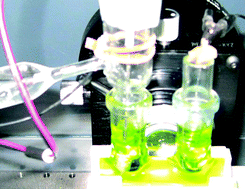Second-order nonlinear optical (NLO) polarisabilities or first hyperpolarisabilities, β, of molecules may be manipulated by reversibly modifying the properties of specific parts of active molecules, usually by on/off switching. This may involve reducing the donor capacity of the electron-rich fragment of a typical donor–acceptor species, D–A, by oxidation or protonation. Conversely, the acceptor behaviour of A may be altered by reduction, or by deprotonation. Alteration of the first hyperpolarisability may also involve structural or chemical modification of the bridging group, thereby interfering with the communication between D and A. Much of the article focuses on redox behaviour of NLO-active metal-containing compounds, mainly describing dipolar species in which the donor fragment containing a metal is oxidised, but giving examples of switching behaviour in octopolar species and of protonation/deprotonation behaviour.
You have access to this article
 Please wait while we load your content...
Something went wrong. Try again?
Please wait while we load your content...
Something went wrong. Try again?


 Please wait while we load your content...
Please wait while we load your content...